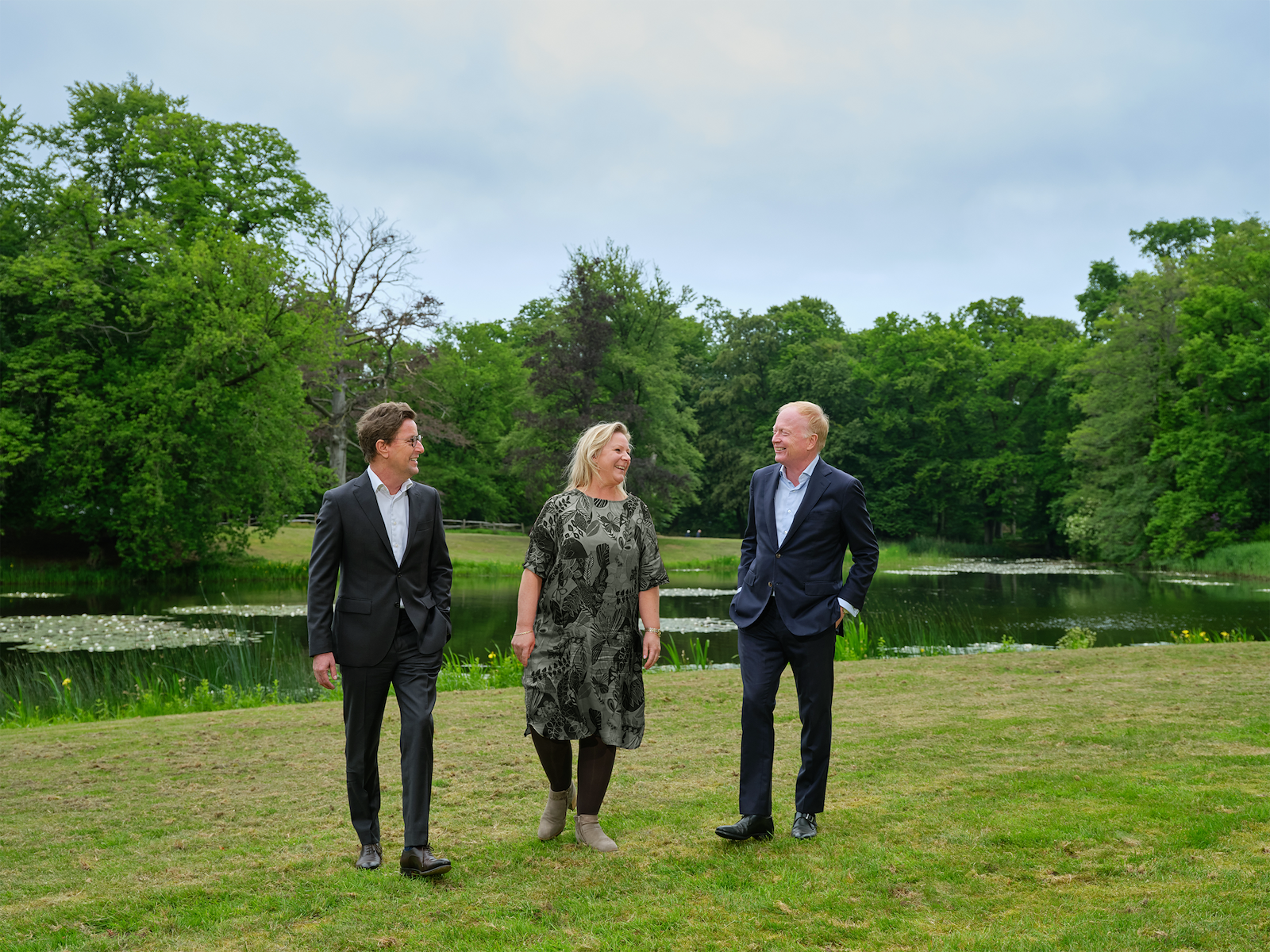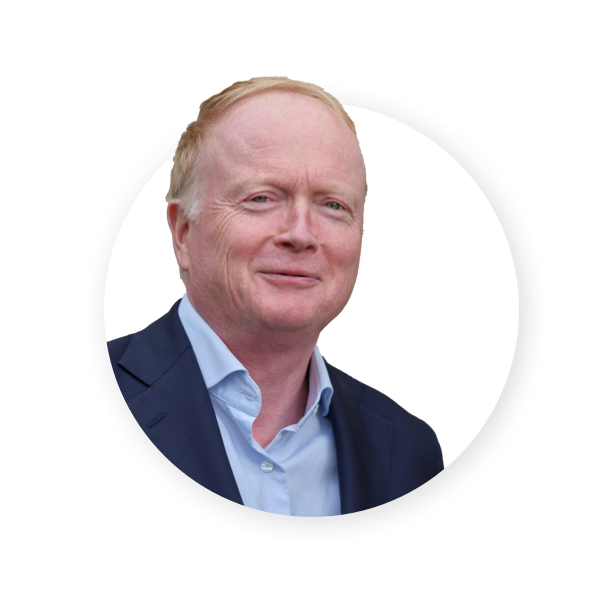Executive Board highlights, lessons learned and outlook
The past few years have been characterised by navigating unexpected crises, operating in an uncertain environment and finding solutions to major societal challenges. This year was no exception and the situation will most likely remain unchanged in the years to come. The need for transformation is more urgent than ever before, both for society at large and for our clients. Effectively bringing about impact and change demands a clear sense of purpose, leadership and collaboration. This is reflected in the way we operate, the decisions we make and the work we do for our clients.

We are making progress in terms of our impact on society. It is our solid conviction that the largest impact we make is through the work we do for clients, both in Audit - providing trust and transparency to capital markets - and in Advisory.
A perfect example is our Future of Energy initiative, where we support our clients in demystifying their net-zero targets with a decarbonisation strategy, and help society transition toward renewable energy sources. We introduced the Deloitte Global Hydrogen Excellence Centre (H2X) to strengthen our hydrogen-related offerings and initiatives, while sharing experience and expertise with markets and clients. Moreover, together with Delft University of Technology, we introduced a Future of Energy Business Course to support the next generation in their development on e.g. decarbonisation and new energy solutions. As part of our Future of Food initiative, we started the ‘dining to net-positive’ movement together with over 25 partners from corporates and start-ups to NGOs across the food ecosystem, to make our food supply chain more sustainable.
In addition to the work we do for and with our clients, we make an impact on society through employee-led initiatives and Deloitte-wide priority programmes of our Deloitte Impact Foundation. We further intensified our focus on financial health. With a large number of households in the Netherlands being financially unhealthy or vulnerable, the urgency to take collective action is greater than it has ever been. We have set up the National Coalition Financial Health together with ING, SchuldenLabNL and many other employers in the public and private sector. The aim of the coalition is clear: to halve the Dutch households that are less financially healthy or vulnerable by 2030.
This past year, we have made progress in many areas of our strategy. Overall, our results show a modest, positive growth of 7.1%. This reflects the performance of our advisory practice as well as significant investments at the start of the year. Our Audit, Tax and Risk Advisory businesses showed robust growth while our Consulting and Financial Advisory businesses contracted slightly (partially driven by the conclusion of large transformation projects for a number of clients). The additional investments in our employee value proposition, our workforce and our capabilities around sustainability and digital put some pressure on our profitability when demand fell short of our plan. We are cautiously optimistic that these investments will pay off in the medium term.
Fiscal year 2022/2023 marked the end of our Strategy 2019-2023. We have become a more purpose driven, sustainable and inclusive organisation with an engaged workforce, making an impact on our clients and creating a clear gap with our main competitors in terms of revenue growth. We are confident about the choice to support our clients’ transition to more responsible and sustainable business models, to contribute to challenges in society and to focus on our people. We feel especially proud of our track record in audit quality. For the third year in a row, we have scored 100% on regulatory quality with positive reviews from regulators.
We have raised the bar in many dimensions of our business. We have strengthened our focus on purpose, for example by setting up the Responsible Business Committee. The Responsible Business Committee plays a pivotal role in determining which clients and engagements we believe to be in line with our purpose and ethical standards. Another example of how we embed purpose is our approach to reducing our own carbon emissions. The introduction of a Sustainable Delivery Framework has empowered our people to deliver our services in an energy-efficient way, and the launch of the GiKi Zero app helps them make more sustainable choices in their personal lives too.
We have stepped up to market leadership, strengthened our network and relationships and improved our Net Promoter Score throughout the years. On top of that, we have grown our cross-business growth platforms by investing in digitalisation and sustainability. We have also stepped up the application of Global Delivery Models, enabling us to use of the full depth of knowledge and capabilities Deloitte has to offer on a global scale.
Considering the challenges ahead for our people, we are very proud of the progress made on talent engagement. The investments in our employee value proposition and creation of a culture of recognition with fair and transparent total reward translated into an increase in our talent engagement score from 7.5 in 2020/2021 to 7.7 in 2021/2022. In 2022/2023, a new methodology was introduced to align and measure our employee engagement scores across NSE.
We have made several changes to become a more inclusive and diverse firm. On the back of a holistic programme driven by active communities (focused on gender, cultural background, neurodiversity and LGBTQ+), we introduced new policies to support Rainbow Families and provide additional support to people in a gender transition process. We also introduced a Reverse Mentoring Programme in which Deloitte leaders are mentored by a colleague with a diverse background to improve their knowledge and sensitivity to challenges related to inclusion and diversity. And, last but not least, we take pride in the increase in the number of female partners from 10% in 2018/2019 up to 22% in 2022/2023. We will continue to invest in the pipeline for more diversity in leadership. We are not yet where we want to be, while at the same time we notice that we are reaching a plateau. This means that it will remain an important focus in the upcoming years.
The composition of the Executive Board and the Executive Committee changed on 1 June 2023. Dagmar Enklaar succeeded Oscar Snijders on the Executive Board. Oscar remains a partner in the Dutch firm and will focus on sustainable transformations at our clients. Rob Bergmans succeeded Liesbeth Mol, who was appointed chair of the Deloitte NSE board. We warmly thank Liesbeth and Oscar for their impact as Executive Board members over the past few years. Their drive, commitment and leadership were essential in the progress we have made, and we wish them all the best in their new roles within Deloitte.
With a new composition of the Executive Committee, we believe that the diversity of perspective increased due to more varied mix of expertise, gender, age and leadership styles. Find the new composition in the About Deloitte section of the report.
Lessons Learned
To fulfil our ambition to be a learning organisation, we reflected on our experience of the past year.
We notice that our clients increasingly work across value chains with multiple partners. This presents both challenges, such as managing the independence between audit and advisory, and opportunities for real impact using our multidisciplinary model. To solve critical challenges in society, such as creating sustainable food chains, we need to work across ecosystems and as Deloitte, we have a clear ambition to be the orchestrator in these ecosystems.
This past year, as in the years before, the audit profession predominantly focused on quality, regulations and the relevance of audits, and rightly so. However, our concern is that the attractiveness of the audit profession is not prominent enough on the agenda. Though we have been very successful in attracting talent, declining inflows of students requires enhancing the profession’s attractiveness to the next generation of auditors. We value the sector initiatives exploring for example how educational programmes to become a Dutch certified Registered Auditor are organised. We have the responsibility to play a role in this respect and will substantially step up our efforts. As Deloitte, we aim to sustain the relevance of audits by focusing on key topics such as ESG, fraud and continuity, as well as by investing in continuous innovation, expanding the use of analytics and automating the more basic, compliance related tasks. Also, our growing Assurance and Audit Advisory practice provides opportunities to develop broader skillsets.
We have made significant steps in using Global Delivery Models in line with our strategy and to address labour market shortages. However, we recognise that significant change and effort is still required and we should be bolder in our ambition. This will make us strategically more flexible, offer a more competitive price point and will enable us to improve the quality of our services due to the depth and breadth of the capabilities of our Global Delivery Centers.
The same is true for the impact of generative artificial intelligence. We already support our clients with the deep capabilities we have, and invest in tooling to change the way we deliver our services. In line with our long‑term focus on innovation and technology, we aim to step up our ambition - given the transformational impact AI has on many of our clients and our own profession.
Outlook
Considering the underlying long-term trends supporting our business and the new opportunities for our services, we are cautiously optimistic about the future yet realistic about the uncertain times still ahead of us.
Our new strategy builds on the foundations we have laid in the past few years and focuses on the big shifts we see as the signposts for the future. These shifts will take us towards a future in which Deloitte is the preferred employer for all, and purpose and profitable growth are an evident combination. We will continue to build trusted relationships with our clients and to be their long-term partner for complex transformations. We will win because of our multidisciplinary model using integrated solutions and by offering innovative, asset-powered services through our Global Delivery Centers. We will further invest in generative artificial intelligence as it will have a transformational impact on our clients and on our service delivery.
Strengthening our collaboration with our global and EMEA network will provide us with new opportunities to increase quality and add value for our clients based in the Netherlands. It will create more possibilities for our Dutch firm to work abroad, while offering impactful work and development opportunities to our people. For us as Executive Board it remains an important matter to make the most of the benefits of our global scale while maintaining our local strength.
We strongly believe that our new strategy 2024-2027 will, once again, provide a platform for growth and impact, and make our business model more future-proof while having purpose at the heart of it.
Rotterdam, July 18, 2023

Hans Honig
Chief Executive Officer
Chairman of the Executive Board

Rob Bergmans
Chief People & Quality Officer

Dagmar Enklaar
Chief Operations Officer